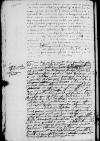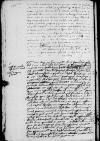Letter #1594
[Ioannes DANTISCUS] to [Jan CHOJEŃSKI]Löbau (Lubawa), 1537-03-16
English register:
Dantiscus congratulates Chojeński on obtaining a high public office (Grand Chancellor). He asks Chojeński not to overstrain himself in fulfilling his new duties.
Dantiscus informs Chojeński that the Prussian gentry’s envoys are spreading false rumors about the Diet in Cracow, saying that all the king’s personnel decisions concerning already assigned canonries and coadjutorships have been withdrawn, and that the king allegedly snubbed Dantiscus in the gift presentations. Dantiscus was told this by the Chełmno voivode (Jan Luzjański), whom he met on his way back to Prussia. Dantiscus sees no positive effects of the reprimand Chojeński gave on behalf of the king to the Prussian gentry’s envoys. He hopes that the lies will be rectified by the royal commissioners coming to the assembly. He has also written on this matter to the king. He is delighted about the 60 florins he received from the king as if there were ten times more of them. He intends to cast a cup from them so that he can drink the king’s health.
Dantiscus asks Chojeński when he plans to go to his diocese. He also asks him to give him the names of the envoys sent by the king to the assembly. He would very much like to see Chojeński among them.
Dantiscus suggests to Chojeński that the Polish king, from the position of a Christian ruler, should rebuke the king of Denmark for imprisoning the bishops. He is also appealing to the Polish bishops, as being better off than him, for help for the Swedish bishops (Ioannes Magnus, Hans Brask, Magnus Haraldsson) who are in exile in Gdańsk and destitute. Dantiscus explains that he cannot help them himself because he spent over 1000 florins during the Diet in Cracow.
Postscript:
Dantiscus asks the addressee to intercede with the king on the matter of Chełmno castellan Mikołaj Działyński appropriating the income from the indulgence that is held twice a year in the Chapel of the Blessed Virgin Mary near Nowe Miasto Lubawskie. Previously, this income was appropriated by the now deceased Płock castellan Wieczwieński. Dantiscus feels obliged to make sure that this income, legally due to the Nowe Miasto Lubawskie parish, is not used for lay purposes.
Manuscript sources:
Prints:
| ||||||||||||
Text & apparatus & commentary Plain text Text & commentary Text & apparatus Excerpts concerning Dantiscus' travels
Reverendissime in Christo Pater et Domine, domine mi colendissime.
Salutem quam diutissime duraturam valetudinemque cf. Adagia 1526 No. 643 Adamantinus ⌊adamante firmioremcf. Adagia 1526 No. 643 Adamantinus ⌋ et prosperrimam in hoc oneroso et gravi munere suscepto, omniaque fausta cum omnis felicitatis augmento in gratia misericordissimi Dei Dominationi Vestrae Reverendissimae, quantum totis eniti viribus possum, precor ex animo,
Rediens huc sospes ad
Dixerat mihi novissime Dominatio Vestra Reverendissima
Ex
Postscript:
Reverendissime mi Domine.
Velim iuxta Letters, the main figure of the Acts of the ApostlesLetters, the main figure of the Acts of the Apostles
Datae
[1 ] Dantiscus congratulates Chojeński on his nomination for Grand Chancellor
[2 ] about the Royal Prussian gentry’s legation to the 1536/37 Diet cf. e.g. cf. Janusz Małłek, Prusy Książęce a Prusy Królewskie w latach 1525 - 1548. Studium z dziejów polskiej polityki księcia Albrechta Hohenzollerna, Warszawa, 1976, series: Rozprawy i Materiały Ośrodka Badań Naukowych im. Wojciecha. Kętrzyńskiego w Olsztynie 53 ⌊Małłek, 1976cf. Janusz Małłek, Prusy Książęce a Prusy Królewskie w latach 1525 - 1548. Studium z dziejów polskiej polityki księcia Albrechta Hohenzollerna, Warszawa, 1976, series: Rozprawy i Materiały Ośrodka Badań Naukowych im. Wojciecha. Kętrzyńskiego w Olsztynie 53 ⌋, p. 131
[3 ] The demand that royal commissioners take part in the Prussian springtime assembly in 1537, to help resolve disputes, was contained both in the gravamina submitted at the 1536/37 Diet and in the opinion about them issued by the Prussian Council. (cf. cf. Gottfried Lengnich, Geschichte der Preussischen Lande Königlich-Polnischen Antheils Seit dem Jahr 1526, Biss auf den Todt Königes Sigismundi I, vol. 1, Dantzig, Johann Daniel Stollen, 1722 ⌊Lengnichcf. Gottfried Lengnich, Geschichte der Preussischen Lande Königlich-Polnischen Antheils Seit dem Jahr 1526, Biss auf den Todt Königes Sigismundi I, vol. 1, Dantzig, Johann Daniel Stollen, 1722 ⌋, doc. No. 76, p. 193-198) ((see also cf.
[4 ] Chojeński, on behalf of the
king, replied to the Prussian gentry’s envoys’ gravamina, which included objections concerning the competence of the Prussian Council in terms of assigning lay and church offices (see cf.
[5 ] Doubtless Chojeński, Płock bishop at the time, was going to his diocese for Easter, which fell on April 1 in 1537
[7 ] The church of the Blessed Virgin Mary stood in the village of Łąki, still in existence in the 19th century, on the right bank of the Drwęca river, about one kilometer north of Nowe Miasto Lubawskie, near the no longer existing Bratian castle. The cult of the Virgin Mary here dates back to the 14th century. According to tradition, an image of Mary appeared on the river. One of the witnesses of the revelations, the Crusader Jan (founder of Bratian castle) built a church there; in later times, it was the destination of numerous pilgrimages, until it burned down in the 19th century
[8 ] The foundation may have been set up simultaneously with the construction of Bratian castle, by the grand master of the Teutonic Order in 1345-51, Henryk Dusemer (d. 1352). Resigning from leadership of the order in 1351, he spent the last year of his life at Bratian castle
[9 ] As a reward for his faithful military and diplomatic service, in 1534 the king allowed Działyński to purchase the Bratian starosty with Neumarkt in the Kulm region from its previous owners, Jan Wieczfiński, Płock castellan,and his sons, and Elżbieta, daughter of Stanisław Wilkanowski


